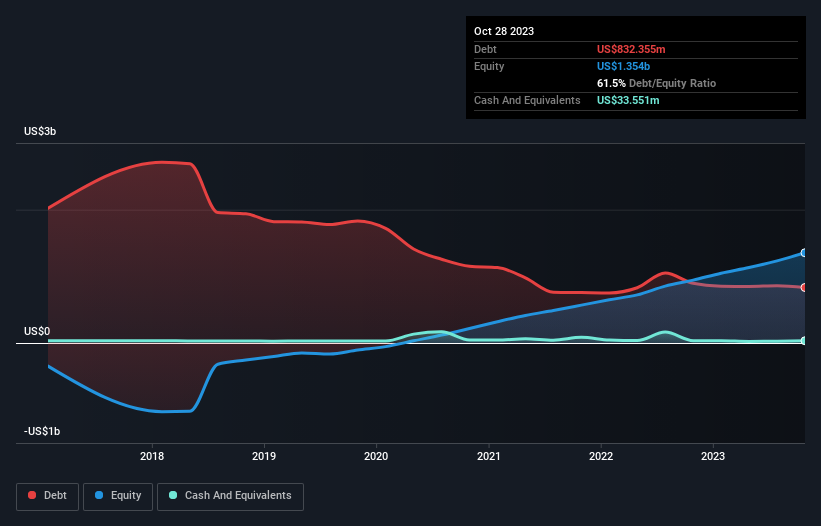- United States
- /
- Food and Staples Retail
- /
- NYSE:BJ
BJ's Wholesale Club Holdings (NYSE:BJ) Has A Pretty Healthy Balance Sheet

David Iben put it well when he said, 'Volatility is not a risk we care about. What we care about is avoiding the permanent loss of capital.' So it seems the smart money knows that debt - which is usually involved in bankruptcies - is a very important factor, when you assess how risky a company is. We can see that BJ's Wholesale Club Holdings, Inc. (NYSE:BJ) does use debt in its business. But is this debt a concern to shareholders?
When Is Debt Dangerous?
Debt assists a business until the business has trouble paying it off, either with new capital or with free cash flow. In the worst case scenario, a company can go bankrupt if it cannot pay its creditors. However, a more usual (but still expensive) situation is where a company must dilute shareholders at a cheap share price simply to get debt under control. By replacing dilution, though, debt can be an extremely good tool for businesses that need capital to invest in growth at high rates of return. When we think about a company's use of debt, we first look at cash and debt together.
View our latest analysis for BJ's Wholesale Club Holdings
What Is BJ's Wholesale Club Holdings's Debt?
As you can see below, BJ's Wholesale Club Holdings had US$832.4m of debt at October 2023, down from US$895.1m a year prior. However, it also had US$33.6m in cash, and so its net debt is US$798.8m.

How Strong Is BJ's Wholesale Club Holdings' Balance Sheet?
Zooming in on the latest balance sheet data, we can see that BJ's Wholesale Club Holdings had liabilities of US$2.74b due within 12 months and liabilities of US$2.74b due beyond that. Offsetting these obligations, it had cash of US$33.6m as well as receivables valued at US$224.5m due within 12 months. So it has liabilities totalling US$5.23b more than its cash and near-term receivables, combined.
This deficit is considerable relative to its market capitalization of US$8.55b, so it does suggest shareholders should keep an eye on BJ's Wholesale Club Holdings' use of debt. This suggests shareholders would be heavily diluted if the company needed to shore up its balance sheet in a hurry.
In order to size up a company's debt relative to its earnings, we calculate its net debt divided by its earnings before interest, tax, depreciation, and amortization (EBITDA) and its earnings before interest and tax (EBIT) divided by its interest expense (its interest cover). Thus we consider debt relative to earnings both with and without depreciation and amortization expenses.
BJ's Wholesale Club Holdings has a low net debt to EBITDA ratio of only 0.80. And its EBIT covers its interest expense a whopping 12.6 times over. So we're pretty relaxed about its super-conservative use of debt. Fortunately, BJ's Wholesale Club Holdings grew its EBIT by 8.5% in the last year, making that debt load look even more manageable. When analysing debt levels, the balance sheet is the obvious place to start. But it is future earnings, more than anything, that will determine BJ's Wholesale Club Holdings's ability to maintain a healthy balance sheet going forward. So if you want to see what the professionals think, you might find this free report on analyst profit forecasts to be interesting.
Finally, a company can only pay off debt with cold hard cash, not accounting profits. So the logical step is to look at the proportion of that EBIT that is matched by actual free cash flow. In the last three years, BJ's Wholesale Club Holdings's free cash flow amounted to 47% of its EBIT, less than we'd expect. That's not great, when it comes to paying down debt.
Our View
On our analysis BJ's Wholesale Club Holdings's interest cover should signal that it won't have too much trouble with its debt. But the other factors we noted above weren't so encouraging. For example, its level of total liabilities makes us a little nervous about its debt. When we consider all the elements mentioned above, it seems to us that BJ's Wholesale Club Holdings is managing its debt quite well. But a word of caution: we think debt levels are high enough to justify ongoing monitoring. When analysing debt levels, the balance sheet is the obvious place to start. However, not all investment risk resides within the balance sheet - far from it. Be aware that BJ's Wholesale Club Holdings is showing 2 warning signs in our investment analysis , you should know about...
If you're interested in investing in businesses that can grow profits without the burden of debt, then check out this free list of growing businesses that have net cash on the balance sheet.
Valuation is complex, but we're here to simplify it.
Discover if BJ's Wholesale Club Holdings might be undervalued or overvalued with our detailed analysis, featuring fair value estimates, potential risks, dividends, insider trades, and its financial condition.
Access Free AnalysisHave feedback on this article? Concerned about the content? Get in touch with us directly. Alternatively, email editorial-team (at) simplywallst.com.
This article by Simply Wall St is general in nature. We provide commentary based on historical data and analyst forecasts only using an unbiased methodology and our articles are not intended to be financial advice. It does not constitute a recommendation to buy or sell any stock, and does not take account of your objectives, or your financial situation. We aim to bring you long-term focused analysis driven by fundamental data. Note that our analysis may not factor in the latest price-sensitive company announcements or qualitative material. Simply Wall St has no position in any stocks mentioned.
About NYSE:BJ
BJ's Wholesale Club Holdings
Operates warehouse clubs on the eastern half of the United States.
Adequate balance sheet and fair value.


